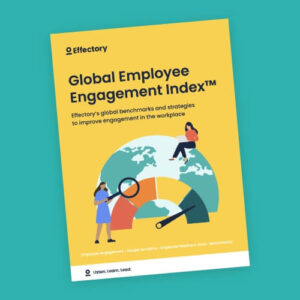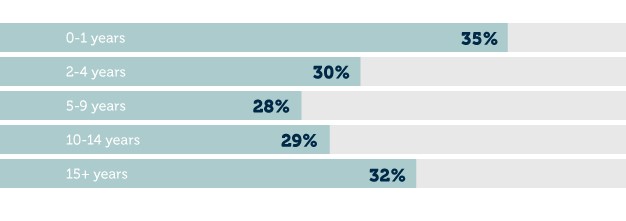Why does employees’ initial engagement rapidly decline? And what can organisations do to stop it?
Engagement and tenure: why initial levels rapidly decline

Over the last six months we extensively investigated engagement and commitment in multinationals. The research has revealed some fascinating general insights, as well as specific areas where multinationals are currently facing challenges.
How managers can create higher engagement levels
One of the many insights we uncovered was the speed at which employees’ initial engagement declines over the first five years of tenure. Worryingly for multinationals, the research also shows that the initial levels never fully recover.
Global Employee Engagement Index™
Discover the Global Employee Engagement Index™ 2025 for key insights on driving employee engagement, improving performance, and enhancing team dynamics.
DownloadEngagement and tenure in multinationals
Average engagement levels by tenure in multinationals
As the above infographic illustrates, the initial level of employee engagement sharply declines before almost recovering at the latter stages employees’ tenure. Whilst the levels in multinationals may compare favourably to many European countries, the U-shape curve is still a cause for concern.
Perhaps the biggest question that arises from our findings is: why are organisations not able to maintain the initial engagement by employees? After all, imagine the impact if the initial levels were maintained and further, were used as a solid basis to increase engagement and commitment.
Employee engagement and commitment by industry
Generally, there are two underlying causes of the sharp decline:
1. Employees discover they don’t love what they initially signed up to do
In many cases employees start a role with the best intentions, believing it to be their dream job. After the first few years the majority of employees realise that the role has failed to live up to their expectation and the initial excitement dwindles. The ‘I love my job’ effect no longer applies and employees lose their initial engagement levels.
2. Employees feel stifled
At the very beginning of employees’ tenure, the enthusiasm and motivation that employees have is clear to see. New ideas, energy, enthusiasm and a fresh perspective on things often accompany new employees. Yet all too frequently, either the structure organisations or more senior employees are stifling such new ideas and perspectives. The result is that newer employees lose their initial drive and excitement to contribute, and eventually engagement levels drop.
Combating the decline
In the first instance, it is often best to discuss with employees what they do love doing. Ideally, HR or managers should sit down with employees to have an open and honest discussion around the subject. When employees fall out of love with their job, investigating the viable alternatives within the company is very valuable. Furthermore, regular communication on the topic is key as it keeps the whole process out in the open.
If there comes a point where it is clear that employees do not love what they do and there is no available alternative, it is important to consider whether continuing the partnership between employee and employer is wise. After all, it is neither in the employee or employer’s interest for the decline in engagement to continue until the employee becomes neither engaged nor committed.
Managers and employee engagement
The two most common causes
In the second instance, organisations need to be aware of instances where employees are being stifled. Tools such as employee surveys are a great anonymous way of uncovering if employees feel suppressed by individuals or the organisation. Most importantly organisations need to keep a constant eye on the subject, as without due attention great harm can be caused to engagement levels.
Let’s talk about employee feedback
Leave us your details, and schedule a time that suits you best and we’ll be in touch! We’re more than happy to help you.
Make an appointment

